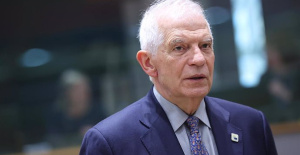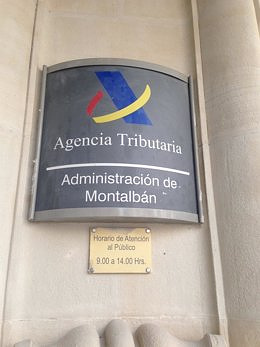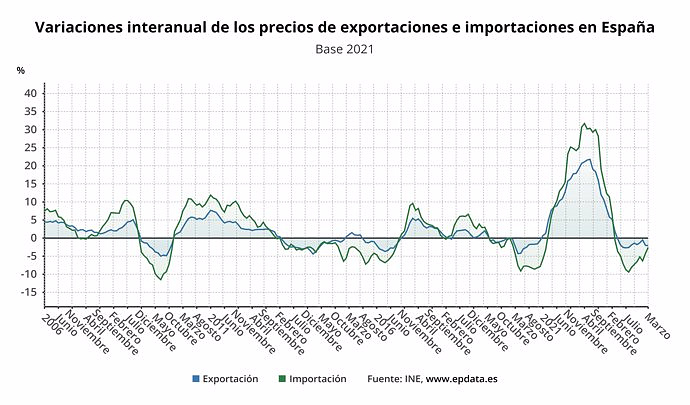The former director of Hacienda Ignacio Ruiz-Jarabo warns that the system that gives bonuses to inspectors is "perverse"
MADRID, 1 Ene. (EUROPA PRESS) -
The Spanish courts have had to amend the plan to the Tax Agency on several occasions in 2022 as a result of claims for fines and penalties for fraud by businessmen and taxpayers. To the list of cases lost by the Treasury in 2021, among which was that of the soccer player Gerard Piqué, the actress Paz Vega or the Galician businessman Amancio Ortega, those of Sito Pons, the businessman José María Aristrain or the former prosecutor Emilio Valerio are now added .
One of the latest cases that has come to light is that of the former motorcycle racer and two-time 250cc world champion Sito Pons. The Court of Barcelona acquitted him at the end of December of the six tax crimes of which the Prosecutor's Office and the Spanish tax agency accused him, for which he faced 24 years in prison.
The court declared proven in the ruling that, in the years between 2010 and 2014, Pons --director of the Pons Racing team-- "spent more than 200 days traveling around circuits throughout the world and was not a tax resident in Spain, but in Monaco (2010 to 2012) and the United Kingdom (2013 to 2014)". The sentence also stated that the athlete "as a taxpayer, has declared income derived from work for someone else and self-employed, as well as interest earned."
Likewise, the magistrates verified that most of Pons' economic interests and financial assets and the core of its economic activity were concentrated and located outside Spanish territory, except for some properties located in Spain.
A similar case is that of the industrialist José María Aristrain, whom the Provincial Court of Madrid acquitted in January 2022 of the crimes of tax fraud of which he had been accused by the Madrid Prosecutor's Office for defrauding the Public Treasury of 211 million euros during fiscal years from 2005 to 2009.
In a sentence, to which Europa Press had access, the magistrates agreed to exonerate the tycoon from fifteen tax offenses for which the Public Ministry requested 64 years in prison. And they did it before the doubts of the court when considering "insufficient" the tests carried out to demonstrate the fraud.
The Prosecutor's Office demanded from the industrialist the payment, as civil liability, of more than 210 million euros and asked that a fine of around 1,190 million euros be imposed.
But the magistrates decided to acquit him based on the principle of 'in dubio pro reo' because they concluded that the evidence provided was "insufficient" and did not allow it to be proven that the defendant simulated a transfer of his habitual residence during the years 2005 to 2009, nor that the effective management of the company was in Spain.
Therefore, they maintained, "all factual basis of the crimes of tax fraud that support the accusation is lost." "If it has not been proven that he was a resident in Spain, nor that he ran said company from Madrid, there is no reason to consider that he was obliged to pay taxes due to such taxes," the ruling states.
Another of the resolutions against the Treasury, in this case the foral one, is that of the Provincial Court of Navarra, which acquitted the former prosecutor Emilio Valerio, accused of fraud against the Treasury, on the understanding that there was insufficient evidence to convict him.
The Prosecutor's Office requested for him a sentence of 38 years in prison and a fine of 4.5 million euros for the alleged falsification of invoices to obtain the "undue return" of the Value Added Tax (VAT) through his companies.
In a judgment of the Superior Court of Justice of Navarra (TSJN), collected by Europa Press, it was explained that it had not been proven that the former prosecutor acting in his double capacity as partner and royal administrator of several companies "devised a plot consisting of making of mendacious invoices in which non-existent deliveries of goods and provision of services from other companies appeared" in order to thus achieve the undue refund of VAT.
In addition, the ruling indicated that it was not proven that these invoices were false, nor that they did not respond to a specific provision of goods and services, "nor that with this the undue return by the foral treasury was achieved" of certain amounts for value of more than four million.
It so happens that, in this specific case, the person who carried out the expert opinion on the ex-prosecutor's companies is the person who was director of the Tax Agency between 1998 and 2001, Ignacio Ruiz-Jarabo. The senior civil servant, already retired and author of the book 'Taxes or freedom', will participate this January in the European Parliament in the presentation of a documentary and will make a speech within the framework of the event 'Can the Spanish Treasury destroy the State of law?' to denounce the abuses of the Tax Agency.
In conversation with Europa Press, Ruiz-Jarabo has advanced that in his presentation he will state that the Spanish legal system is unbalanced and the State enjoys many powers in its favor that it does not use in a "rational and moderate" way. What's more, he has added that far from making a "tempered" use of these "oversized" powers, he uses them "by slitting the throat" in the case of the Treasury.
In Ruiz-Jarabo's opinion, this causes that in cases in which the tax authorities lose in court, the resolutions arrive 5 or 6 years after the start of the proceedings, which usually include asset seizures, which means that the damage caused be irreparable.
In addition, he has regretted that there are no negative consequences for inspectors, the Prosecutor's Office or the State Attorney's Office when the inspections by the Tax Agency fail, and he understands that they should respond when unfounded damage is caused.
What's more, he has denounced that far from being punished, they usually "get off scot-free, if not benefited by a global bonus" that inspectors usually receive for all their actions. "This is perverse and diabolical because you charge if you get more from the taxpayer," she emphasized, adding that it generates defenselessness and legal uncertainty, especially for businessmen.
Although the data is not from this 2022, the last known report of the Economic-Administrative courts (2020), attached to the Treasury, stated that the tax authorities had lost half of the lawsuits against taxpayers. Thus, they won 45.26 percent of the cases that had reached that instance, while in 46.96 percent of the claims, the ruling had fallen on the side of the Treasury.
On the other hand, in the field of Community Justice, the opinion of the Court of Justice of the European Union (CJEU) was known in January 2022, which declared the system of sanctions that the Treasury applies to taxpayers who do not declare correctly and on time illegal. their property and assets abroad, concluding that it is a "disproportionate" measure that contravenes EU law.

 Exploring Cardano: Inner Workings and Advantages of this Cryptocurrency
Exploring Cardano: Inner Workings and Advantages of this Cryptocurrency Seville.- Economy.- Innova.- STSA inaugurates its new painting and sealing hangar in San Pablo, for 18 million
Seville.- Economy.- Innova.- STSA inaugurates its new painting and sealing hangar in San Pablo, for 18 million Innova.- More than 300 volunteers join the Andalucía Compromiso Digital network in one month to facilitate access to ICT
Innova.- More than 300 volunteers join the Andalucía Compromiso Digital network in one month to facilitate access to ICT Innova.-AMP.- Ayesa acquires 51% of Sadiel, which will create new technological engineering products and expand markets
Innova.-AMP.- Ayesa acquires 51% of Sadiel, which will create new technological engineering products and expand markets Borrell points out that several EU countries may recognize the State of Palestine in May
Borrell points out that several EU countries may recognize the State of Palestine in May The CNMV prohibits the funds that sold shares to Apollo in its takeover bid from purchasing more Applus securities
The CNMV prohibits the funds that sold shares to Apollo in its takeover bid from purchasing more Applus securities STATEMENT: SUNRATE partners with YeePay to empower Chinese companies to navigate global expansion
STATEMENT: SUNRATE partners with YeePay to empower Chinese companies to navigate global expansion Nadal is still alive and exciting in Madrid
Nadal is still alive and exciting in Madrid How Blockchain in being used to shape the future
How Blockchain in being used to shape the future Not just BTC and ETH: Here Are Some More Interesting Coins Worth Focusing on
Not just BTC and ETH: Here Are Some More Interesting Coins Worth Focusing on They create a bank of machinery sounds to prevent breakdowns through artificial intelligence
They create a bank of machinery sounds to prevent breakdowns through artificial intelligence UPV students build a prototype of a wooden house to move to Equatorial Guinea
UPV students build a prototype of a wooden house to move to Equatorial Guinea The UA opens the call for the Impulso 2024 Awards for the best innovative business initiatives
The UA opens the call for the Impulso 2024 Awards for the best innovative business initiatives ALI, virtual assistant from Alicante, internationally recognized by the OECD
ALI, virtual assistant from Alicante, internationally recognized by the OECD A million people demonstrate in France against Macron's pension reform
A million people demonstrate in France against Macron's pension reform Russia launches several missiles against "critical infrastructure" in the city of Zaporizhia
Russia launches several missiles against "critical infrastructure" in the city of Zaporizhia A "procession" remembers the dead of the Calabria shipwreck as bodies continue to wash up on the shore
A "procession" remembers the dead of the Calabria shipwreck as bodies continue to wash up on the shore Prison sentences handed down for three prominent Hong Kong pro-democracy activists
Prison sentences handed down for three prominent Hong Kong pro-democracy activists ETH continues to leave trading platforms, Ethereum balance on exchanges lowest in 3 years
ETH continues to leave trading platforms, Ethereum balance on exchanges lowest in 3 years Investors invest $450 million in Consensys, Ethereum incubator now valued at $7 billion
Investors invest $450 million in Consensys, Ethereum incubator now valued at $7 billion Alchemy Integrates Ethereum L2 Product Starknet to Enhance Web3 Scalability at a Price 100x Lower Than L1 Fees
Alchemy Integrates Ethereum L2 Product Starknet to Enhance Web3 Scalability at a Price 100x Lower Than L1 Fees Mining Report: Bitcoin's Electricity Consumption Declines by 25% in Q1 2022
Mining Report: Bitcoin's Electricity Consumption Declines by 25% in Q1 2022 Oil-to-Bitcoin Mining Firm Crusoe Energy Systems Raised $505 Million
Oil-to-Bitcoin Mining Firm Crusoe Energy Systems Raised $505 Million Microbt reveals the latest Bitcoin mining rigs -- Machines produce up to 126 TH/s with custom 5nm chip design
Microbt reveals the latest Bitcoin mining rigs -- Machines produce up to 126 TH/s with custom 5nm chip design Bitcoin's Mining Difficulty Hits a Lifetime High, With More Than 90% of BTC Supply Issued
Bitcoin's Mining Difficulty Hits a Lifetime High, With More Than 90% of BTC Supply Issued The Biggest Movers are Near, EOS, and RUNE during Friday's Selloff
The Biggest Movers are Near, EOS, and RUNE during Friday's Selloff Global Markets Spooked by a Hawkish Fed and Covid, Stocks and Crypto Gain After Musk Buys Twitter
Global Markets Spooked by a Hawkish Fed and Covid, Stocks and Crypto Gain After Musk Buys Twitter Bitso to offset carbon emissions from the Trading Platform's ERC20, ETH, and BTC Transactions
Bitso to offset carbon emissions from the Trading Platform's ERC20, ETH, and BTC Transactions Draftkings Announces 2022 College Hoops NFT Selection for March Madness
Draftkings Announces 2022 College Hoops NFT Selection for March Madness























